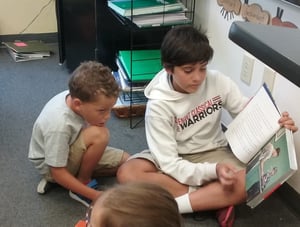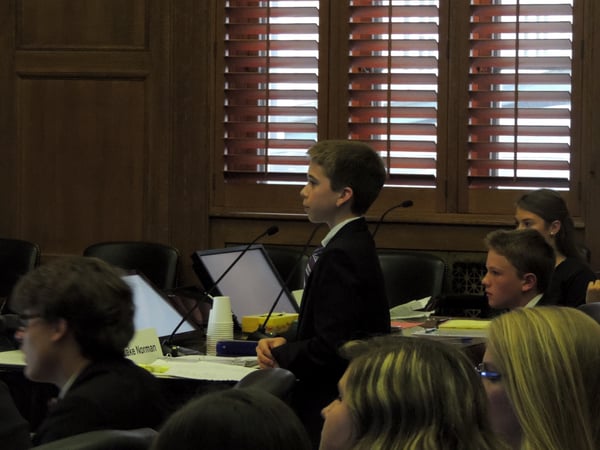I struck the match, lit the fuse in front of me, then ran for cover. Crouching behind the chair, I put my hands over my ears, squeezed my eyes shut, and waited for the explosion. Nothing happened. Cautiously, I went back to see. No, I wasn’t verifying a stick of dynamite; I was counting 13 birthday candles on my daughter’s cake--she’d become a teenager!
In this oft-repeated scenario, a curious phenomenon happens: children who become adolescents eventually turn into adults and life goes on. The transitions that occur are a natural process and the good news is there are ways to help your kids ease their way into adulthood.
 First, let’s examine the changes.
First, let’s examine the changes.
Yes, yes, their bodies are changing, but did you realize that there are unusual consequences to this?
- tripping. Oh boy, this age could corner the market on Funniest Home Videos.
- dropping and breaking things: there went the last of the wedding dishware.
- forgetting: “I just told you to put away your clean clothes.” Puzzled look. “You did?”
- sleeping and yet, feeling too grown to go to bed at a decent hour: That’s why God invented naps.
- eating: Parents, get a part-time job to support those exploding eating habits!!
- swinging moods: It’s helpful to model (and then explain) how YOU deal with crankiness and upset feelings. CAUTION: be careful of self-fulfilling prophecy. Teens who are told they are difficult monsters who never listen to their parents–guess what?? By contrast, teens who are told, “Your tone of voice at this moment is inappropriate, so please come back when you feel more in control,” begin to view themselves as respected members, able to control their emotions and voices.
YOU are your child’s best ally. If you think about it, teenagers are emerging from a stable, secure environment where their every need is met, and they are entering an unstable, unfamiliar world called adulthood where they are expected to be responsible for everything from what to eat to how to get it. Wouldn’t you be a little cuckoo? Wouldn’t you cry at unexpected times? Storm around or isolate yourself? What’s that? You did? Hey, we all did! Therefore, keep communication open and your relationship can thrive during this important phase—be of good cheer!
 More positives: they are empathetic, sensitive, and full of energy.
More positives: they are empathetic, sensitive, and full of energy.
This is the best age for service projects and missions. For example, at our school, sixth graders are paired with kindergartners for weekly “Reading Buddies.” It’s a time that produces some amazing fruit. Projects like diaper drives or nursing home visits? Grab those middle schoolers and you’re guaranteed success.
What about school?
The dialectic stage begins around 6th grade with academic emphasis on the logic of ideas, such as compare/contrast and cause/effect. In fact, a formal logic class is ideal because they learn to (properly) argue.
Remember your four-year-old’s incessant “But why?”
OK, teens are entering the 2nd phase of this age-old question. They are arguing because they are beginning to wrestle with adult ideas. This is a good thing!
They are wondering why do people behave this way? why is there suffering? and of course, because they could all be lawyers at this age, they might give you the, “why do I have to make up my bed when I’m just going to mess it back up again?” (You are still allowed to go with the old, “Because I said so,” on that last one . . . .)
 To accommodate this, teaching methods must alter. Piles of information to be regurgitated, a common middle and high school trend, ought to be avoided. Instead, teenagers thrive on investigations, debates, and mock trials. These uniquely classical methodologies are all about analysis.
To accommodate this, teaching methods must alter. Piles of information to be regurgitated, a common middle and high school trend, ought to be avoided. Instead, teenagers thrive on investigations, debates, and mock trials. These uniquely classical methodologies are all about analysis.
Facts are looked at from every angle so that knowledge is enhanced by understanding. Lofty goals? Sure, and every child matures at their own pace so don’t be alarmed if most of your conversations still revolve around the topic of recess. It will come. Rest assured, they will one day be adults.
But for now, it’s all about transition.
As children begin to wean themselves from their parents, the road may be bumpy. Isaiah 57:14 has good advice: “Build up, build up, prepare the road!” two times the praise/words of encouragement to them, and be sure to prepare yourself in prayer), “Remove the obstacles out of the way” (the main obstacle sometimes is “the flesh”—it’s good to help them see the benefits of pressing through) “of my people” (they are His after all, right?) Praise the Lord for teenagers! Praise the Lord for his help in raising them!
BIO: Terry Cross went through this process four times while raising their children; now she voluntarily continues to go through it with sixth graders year after year in school. She is alive to talk about it.



